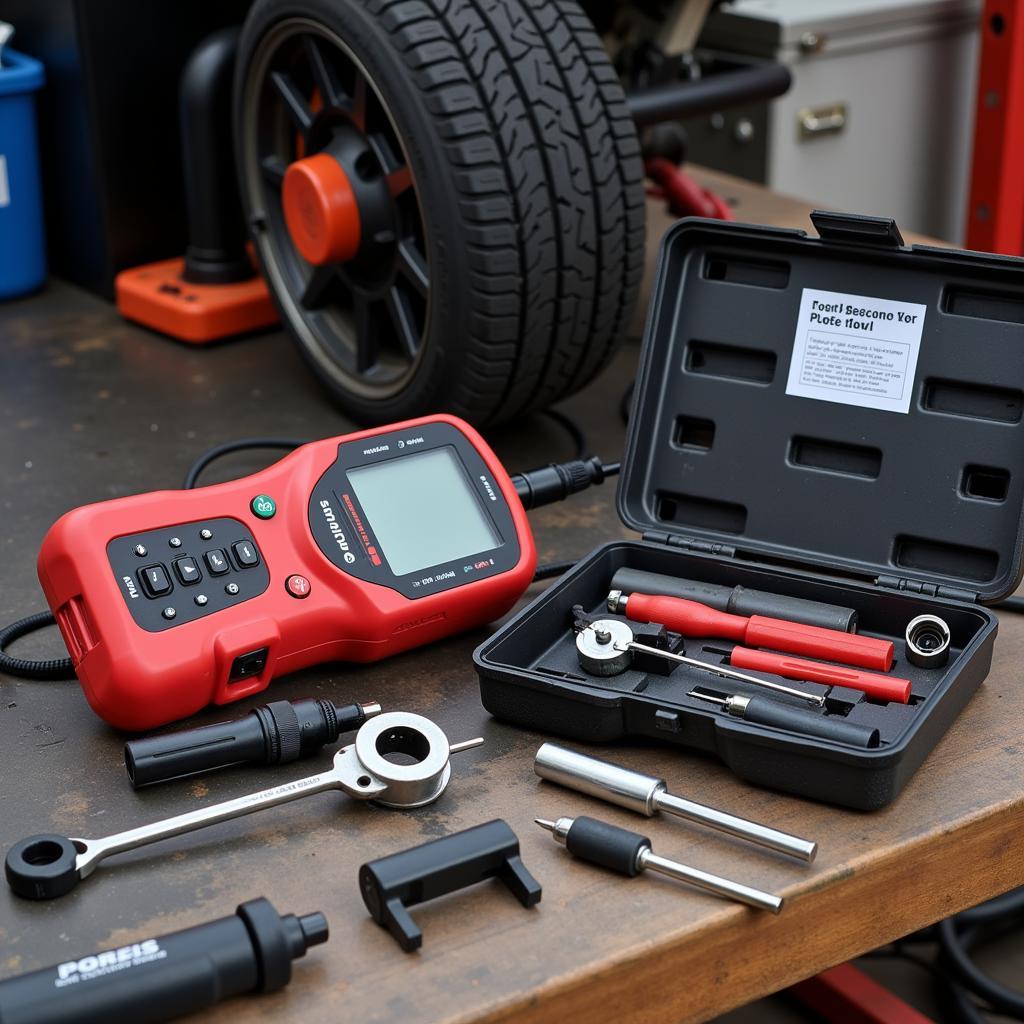Having the right tools in your car can be the difference between a minor inconvenience and a major headache. What Tools Should You Have In Your Car to handle common roadside emergencies and keep your vehicle running smoothly? Let’s explore the essential car tools every driver should consider.
Essential Tools for Every Driver
A well-stocked toolkit is a must-have for any driver. Whether you’re dealing with a flat tire, a loose battery terminal, or a minor mechanical issue, having these essential tools on hand can save you time, money, and frustration.
- Jumper Cables: Dead battery? Jumper cables are your lifeline. These are essential for getting your car started again, especially in cold weather or if you accidentally leave your lights on.
- Tire Pressure Gauge: Maintaining proper tire pressure is crucial for fuel efficiency and safe handling. A reliable tire pressure gauge helps you keep your tires inflated correctly.
- Lug Wrench: Essential for changing a flat tire. Make sure it fits your car’s lug nuts.
- Jack: Used in conjunction with the lug wrench to lift your vehicle safely when changing a tire. Ensure your jack is rated for your car’s weight.
- Screwdrivers (Phillips and Flathead): These versatile tools can be used for a variety of tasks, from tightening loose screws to prying open panels.
- Pliers: Useful for gripping, cutting, and bending wires or other small parts.
- Duct Tape: A true multi-purpose tool for temporary repairs, securing loose items, or even patching a small hole in a hose.
- Work Gloves: Protect your hands while working on your car.
- Safety Vest and Triangles: Increase visibility and safety if you have to pull over on the side of the road, especially at night.
- First-Aid Kit: Essential for dealing with minor injuries.
Beyond the Basics: Expanding Your Car Tool Kit
While the basic tools listed above are a great starting point, consider adding these additional items for even more preparedness.
- Multi-Tool: A compact multi-tool, like the one mentioned in our swiss force multi tool fresenius kidney care article, can offer a variety of functionalities in a small package.
- Flashlight: Essential for working on your car at night or in low-light conditions.
- Tow Strap: Useful for pulling your car out of a ditch or other sticky situation. Make sure it’s rated for your vehicle’s weight.
- Electrical Tape: For insulating and repairing electrical connections.
- WD-40: A lubricant and penetrant that can help loosen rusted bolts and other stuck parts.
- Rag or Paper Towels: For cleaning up spills and wiping your hands.
- Owner’s Manual: Your car’s owner’s manual contains important information about your specific vehicle, including maintenance schedules and troubleshooting tips.
What Tools Should You Have In Your Car for Specific Situations?
Different situations may require specialized tools. For example, if you’re planning a camping trip and intend to use power tools, you might want to know how to use your car battery for power tools. Or if you’ve locked your keys inside, you might need a specific tool to open car door autozone. Having a comprehensive list of tools, like the ones highlighted in our tools you should always have in your car article, is invaluable in such scenarios.
“Having a well-stocked toolkit in your car not only prepares you for emergencies but also empowers you to handle minor issues yourself, saving you both time and money,” says automotive expert, Michael Davies, ASE Certified Master Technician.
 Specialized Car Tools for Specific Situations
Specialized Car Tools for Specific Situations
Conclusion
Knowing what tools should you have in your car can greatly improve your preparedness for roadside emergencies and empower you to address minor car troubles confidently. By assembling a comprehensive car toolkit, you’ll gain peace of mind knowing that you’re equipped to handle unexpected situations.
FAQ
- What’s the most important tool to have in my car? Jumper cables are often considered the most essential tool.
- Do I need to buy a pre-made car toolkit? While convenient, building your own allows you to customize it to your specific needs.
- Where should I store my car toolkit? The trunk is the most common and practical location.
- How often should I check my car tools? At least twice a year, ensure everything is in working order and replace anything damaged or missing.
- What if I don’t know how to use these tools? Many online resources and videos can teach you basic car maintenance and repair skills.
For further assistance, explore our edmunds car finder tool.
You might also be interested in articles about specific car tools and maintenance tips on our website.
Need help? Contact us via WhatsApp: +1(641)206-8880, Email: [email protected] or visit us at 910 Cedar Lane, Chicago, IL 60605, USA. Our customer service team is available 24/7.

Leave a Reply